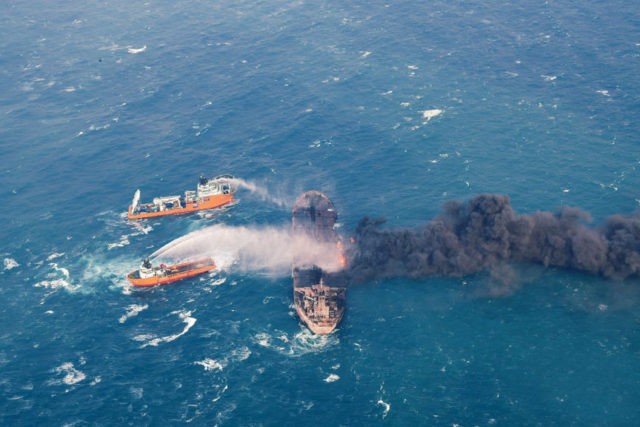A burning Iranian oil tanker that crashed in the East China Sea has sunk after one week of rescue operations, Chinese media have confirmed.
China Central Television (CCTV) said that the ship sunk on Sunday after “suddenly igniting” around noon local time, killing all 32 crew members on board. Just three bodies had already been located.
“There is no hope of finding survivors among the (missing) 29 members of the crew,” Mahmoud Rastad, the head of Iran’s maritime agency, told CCTV.
The oil tanker was transporting around 136,000 tonnes of condensate, an ultralight version of crude oil, when it crashed into a Hong Kong-bound bulk carrier around 160 miles off the coast of Shanghai.
The incident sparked an international rescue operation involving Chinese, South Korean, and American authorities, although efforts were hindered by extreme weather conditions such as strong winds, high waves, and toxic fumes.
Last Wednesday, rescue efforts were suspended after the tanker partially exploded, although victims’ families still remained hopeful that their loved ones would be found.
Chinese authorities confirmed on Monday they had retrieved the ship’s voice data recorder, referred to as the “black box,” and would now carry out an investigation to the “strictest international standards.”
“Finding the black box will be helpful for all parties in correctly determining the reasons for the accident,” Chinese foreign ministry spokesman Lu Kang said on Monday.
South Korean authorities had previously predicted that the blaze could go on for weeks, although Chinese officials have since confirmed that all fires had burnt out.
Amidst the ongoing anti-government protests in Iran, the country’s supreme leader Ayatollah Ali Khamenei declared Monday as a national day of mourning for the victims.
“I extend my sincere condolences to the mourning families and survivors of the Sanchi oil tanker’s crew, who passed away during the heartbreaking incident of the burning and sinking tanker,” Khamenei said in a statement. “These beloved ones lost their lives while on duty, serving their country; and this is a great honor that may reduce the weight of grief and soothe the agonizing hearts of their surviving kin.”
The tragedy now also poses serious environmental concerns. Reports state that the tanker has created a 10-mile oil slick that could wreak havoc on the marine’s ecosystem that already suffers from high levels of pollution.
“As with all major oil spills, time is of the essence. This is particularly so with condensate spills, as the substance is so toxic and volatile,” U.S. marine scientist Rick Steiner told Reuters.
“The key issue is how much exactly the condensate oil has been left after all the burning and explosion, and how much of that sank together to the bottom of the sea,” Ma Jun, director of the private Institute of Public and Environmental Affairs in Beijing, told ABC. “We need to keep an eye to prevent (toxins) being transferred to the fishing ground.”
It is the second collision by an Iranian oil tanker to occur within 18 months, after an Iranian supertanker crashed with a container ship in the Singapore Strait in July 2016. There was no evidence of injuries or oil contamination.
Follow Ben Kew on Facebook, on Twitter at @ben_kew, or email him at bkew@breitbart.com.

COMMENTS
Please let us know if you're having issues with commenting.